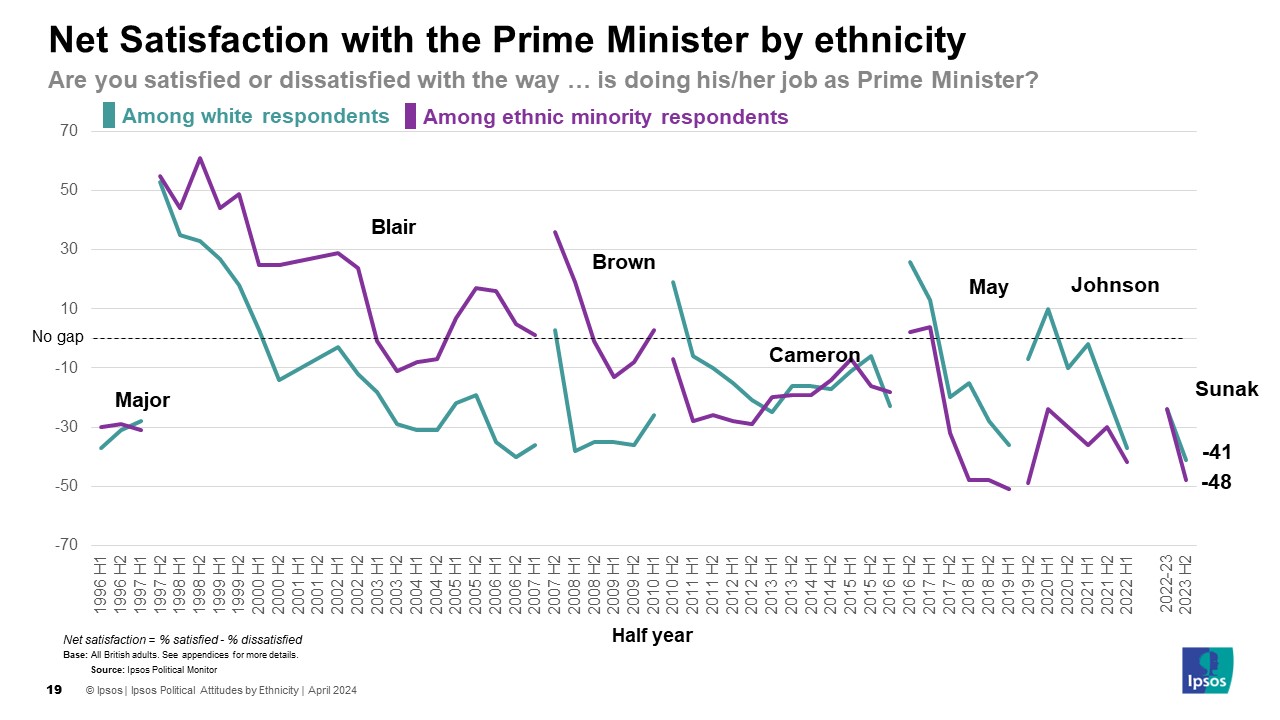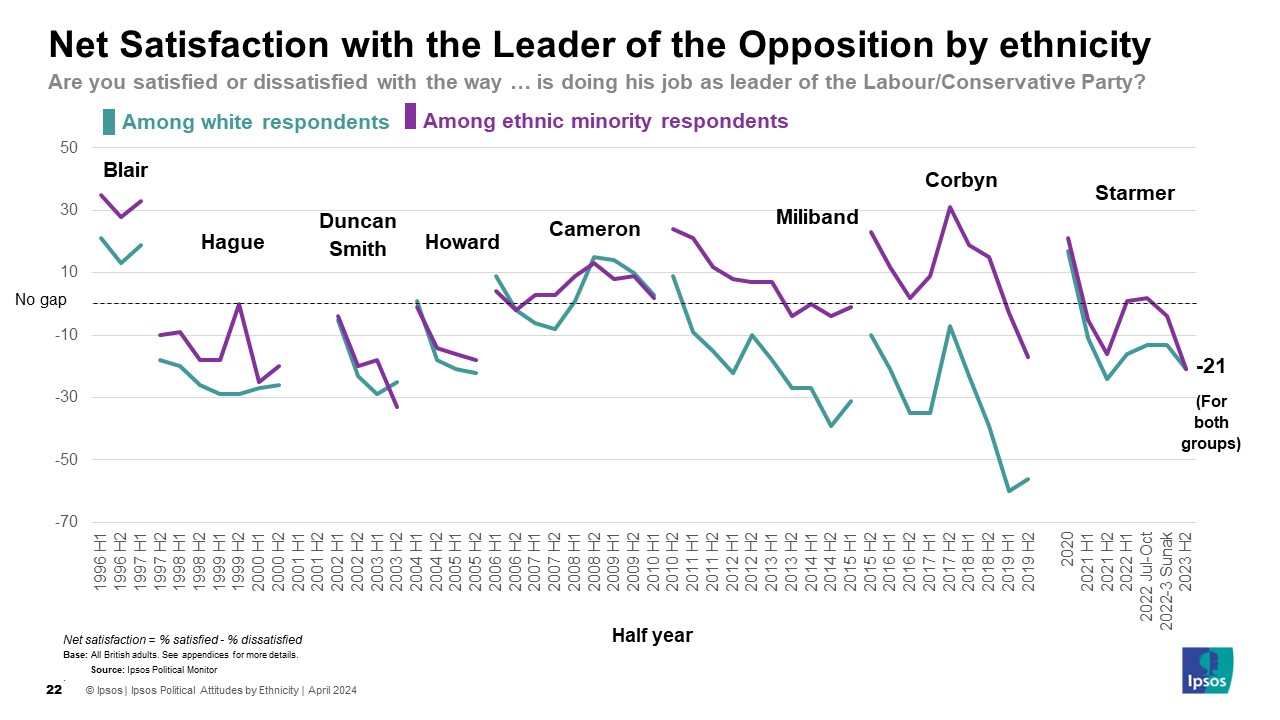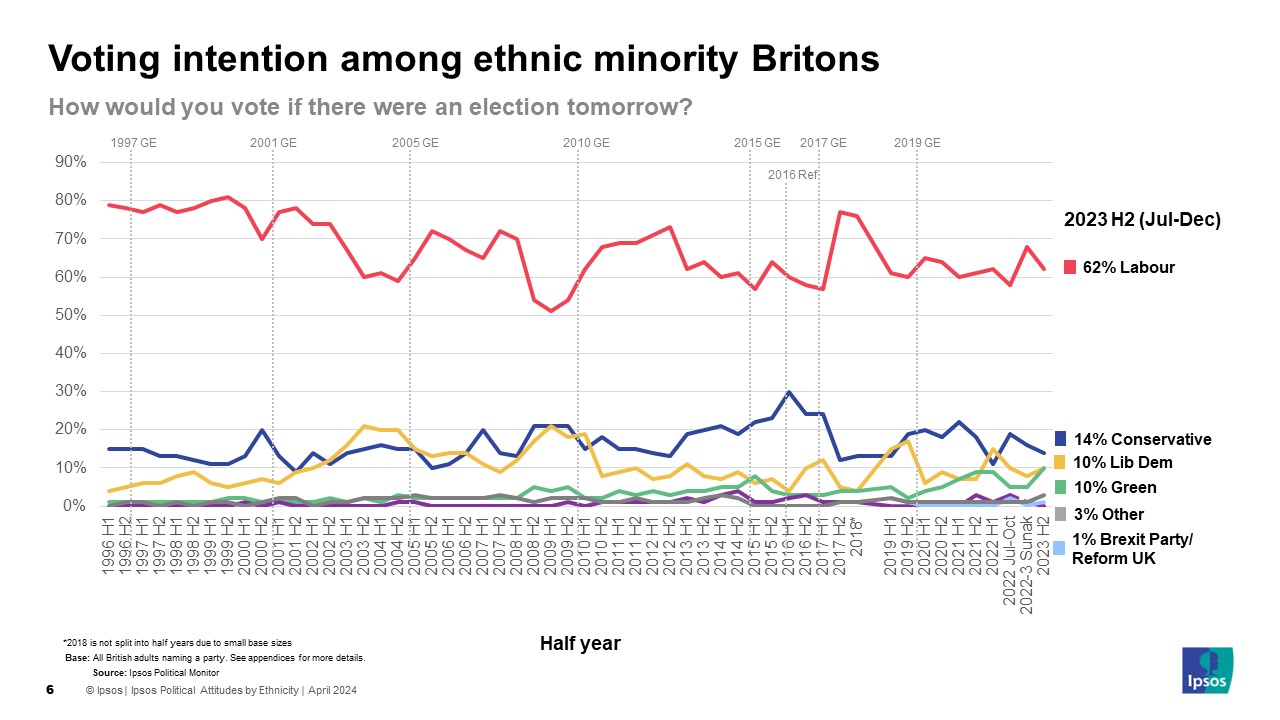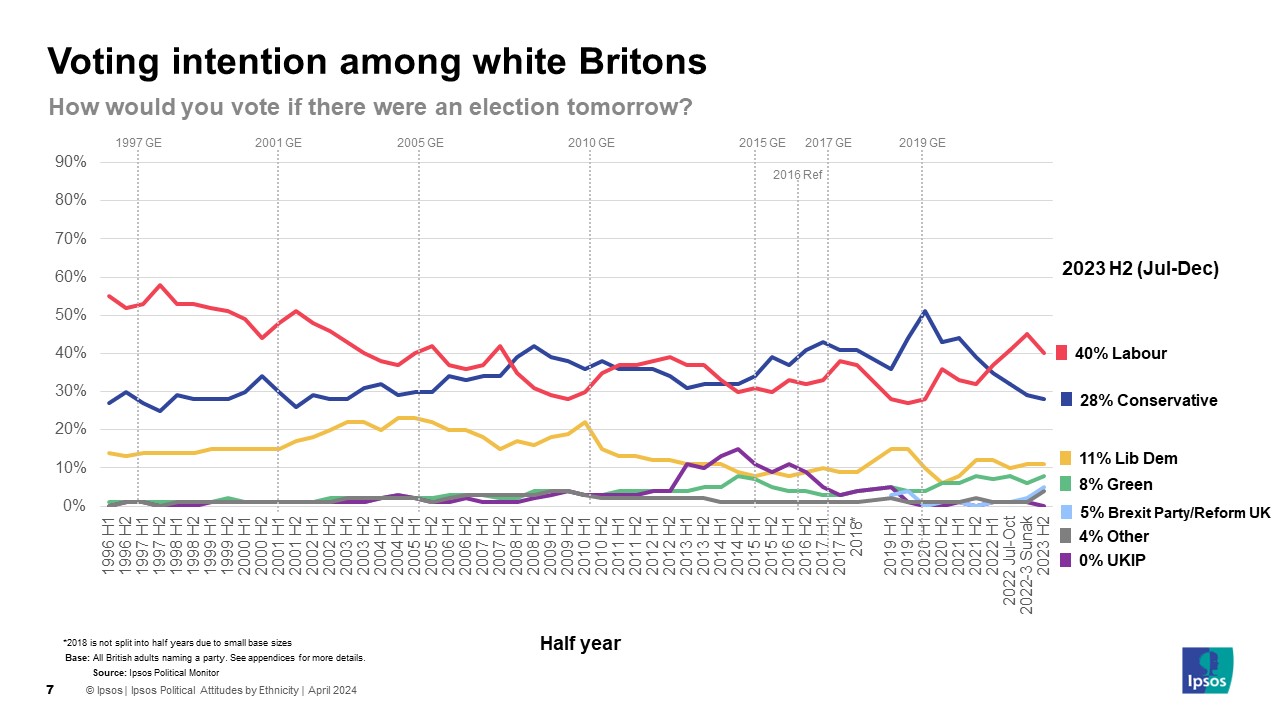Ipsos analysis shows falling satisfaction with Rishi Sunak and Keir Starmer amongst ethnic minorities in Britain
- As part of an ongoing series, Ipsos is publishing its latest biannual voting intention and leader satisfaction ratings amongst white and ethnic minority Britons.
- The latest data, collected in the second half of 2023, shows net satisfaction with Rishi Sunak falling from -24 in his first eight months to -41 amongst white Britons and from -24 to -48 amongst ethnic minorities
- Net satisfaction with Keir Starmer falls from -13 to -21 amongst white Britons and from -4 to -21 amongst ethnic minorities over the same period. This is the lowest level a Labour leader has recorded among ethnic minorities in our series.
A new study released by Ipsos explores voting intention and leader satisfaction ratings amongst ethnic minority and white Britons from 1996 to the second half of 2023. This is done by taking historic Ipsos Political Monitor polls and combining them into aggregated 6 monthly data points, therefore allowing for sufficient sample sizes of both groups for analysis purposes. This is the second report of this kind that Ipsos has published, adding data for the second half of 2023 to the existing time series published last year. A detailed report, with more on methodology and other findings, accompanies this release. Some key findings are summarised below:
Leader satisfaction amongst ethnic minorities 1996-2023
- In the second half of 2023, 19% of ethnic minorities in Britain were satisfied with the job Rishi Sunak was doing as Prime Minister and 67% were dissatisfied. This gives Sunak a net satisfaction score of -48 with this group, down from -24 for the first period of his premiership between November and June 2023.
- Amongst white Britons, 24% were satisfied with the job Rishi Sunak was doing in the second half of 2023 and 65% were dissatisfied. This net score of -41 had fallen from -24 in the period of November 2022 to June 2023.

- In the second half of 2023 (June to December), 27% of ethnic minorities were satisfied with the job Keir Starmer was doing as Labour leader and 48% were dissatisfied. This reflected a net satisfaction score of -21, down from -4 in the previous period. This is the lowest net satisfaction score a Labour leader of the opposition has recorded among ethnic minority Britons in our Ipsos series going back to 1996 (the previous low was -17 under Jeremy Corbyn in the second half of 2019).
- Amongst white Britons Keir Starmer’s satisfaction ratings also fell to -21 (31% satisfied and 52% dissatisfied), albeit the fall was not as sharp (as white Britons were starting at a lower base of -13 in the previous wave).

Does a ‘Gaza effect’ help explain falling satisfaction with the two main party leaders amongst ethnic minorities?
When analysing the impact of the October 7th attacks and subsequent war in Gaza on public opinion, we must first acknowledge that some of the data collected in the second half of 2023 predates these events. Data for the second half of 2023 includes waves undertaken in July and September which preceded the October 7th attacks and data collected in October, November and December that followed. When we split net satisfaction scores by these time periods, we can clearly see net satisfaction with both leaders falls amongst ethnic minorities during October – December but not with white Britons. A trend particularly acute for Keir Starmer.
| Group | Sunak | Starmer | ||||
|---|---|---|---|---|---|---|
Nov 22 - June 23 | July-Sept | Oct-Dec | Nov 22 - June 23 | July-Sept | Oct-Dec | |
White | -24 | -40 | -41 | -13 | -24 | -20 |
Ethnic | -24 | -40 | -53 | -4 | -3 | -32 |
Note: n sizes quoted are white / ethnic minority n sizes for that time period.
Therefore, whilst this doesn’t prove causation, this does suggest there may be some ‘Gaza effect’ amongst ethnic minorities that may be contributing to the fall in satisfaction ratings.
However, we must acknowledge that there is uncertainty when it comes to the scale of impact. Just because a change occurs after an event does not mean that said event is the sole (or even the main) reason for that change – there may be other factors. Furthermore, we also need to allow for wider margins of error than a normal national poll. The base sizes for ethnic minorities are small, especially when breaking it down even further like this. Moreover, it should be noted that we do not control for the composition of the ethnic minority audience each wave (i.e., this analysis is based on our normal nationally-representative weights, not specific weights for the profile of ethnic minorities), so some sample variation could be at play.
Voting intention amongst ethnic minorities 1996-2023
In terms of voting intention, there was little change in the “ethnicity voting gap” for both Labour and the Conservatives in the second half of 2023. The Conservatives’ vote share remained low among both white and ethnic minority Britons, while Labour’s vote share dipped slightly, and by a similar amount, amongst both groups.
Amongst ethnic minorities, Labour leads the Conservatives by 48 points, similar to its 52-point lead in the first 8 months of Rishi Sunak’s leadership. However, Labour’s share has fallen from 68% in the period November to June 2022, to 62% in the second half of 2023, broadly back to its average level since 2019. The Conservative share has fallen marginally from 16% to 14% in the same period. Meanwhile, the Lib Dems and Greens are both on 10% (up from 8% and 5%, respectively).

Amongst white Britons, Labour led by 12 points in the second half of 2023 (40% to 28%). Labour’s share falling 5 points and the Conservatives falling one compared to the period November 2022 to June 2023.

Commenting on the findings Ipsos Director of Politics Keiran Pedley said:
Analysis of Ipsos polling data from the second half of 2023 shows both Rishi Sunak and Keir Starmer becoming less popular amongst white and ethnic minority Britons compared to the first 8 months of Sunak’s time as Prime Minister. Falling satisfaction amongst ethnic minorities towards Keir Starmer is particularly acute and there is evidence to suggest a ‘Gaza effect’ may help to explain at least some of this. However, this does not appear to have a significant impact on voting intention figures at the macro level. Whilst Labour’s share has fallen slightly amongst ethnic minorities, they still retain a substantial lead over the Conservatives, with smaller parties being the most likely to benefit.
About this research
- This study uses historic Ipsos Political Monitor data to explore voting intention and leader satisfaction ratings amongst white Britons and ethnic minorities from 1996 to the end of 2023.
- This was done by aggregating Ipsos polling every 6 months in that time period to build larger sample sizes for ethnic minorities at each data point.
- In practice, this means most years included in this study will have two data points e.g. 1996 H1 (half one) and H2. There are two exceptions.
- In 2018 there is just one data point due to fewer polls being conducted that year and therefore there being insufficient sample size to produce two waves of data.
- The wave before this one ran from November 2022 to June 2023. This reflects the time period from when Rishi Sunak took over as PM to the latest biannual data point of June last year.
- Note. On average, each wave of voting intention polling since 2010 includes approximately 350-450 ethnic minority respondents. This allows for comparisons between ethnic minority and white Britons as a whole but does not allow for analysis of subgroups within that. Breaks for ethnicity are taken from polls weighted to the overall GB population (we have not weighted ethnic minorities separately). Margins of error will be wider than a standard opinion poll, and as with all polls may be subject to a range of different sources of error.





